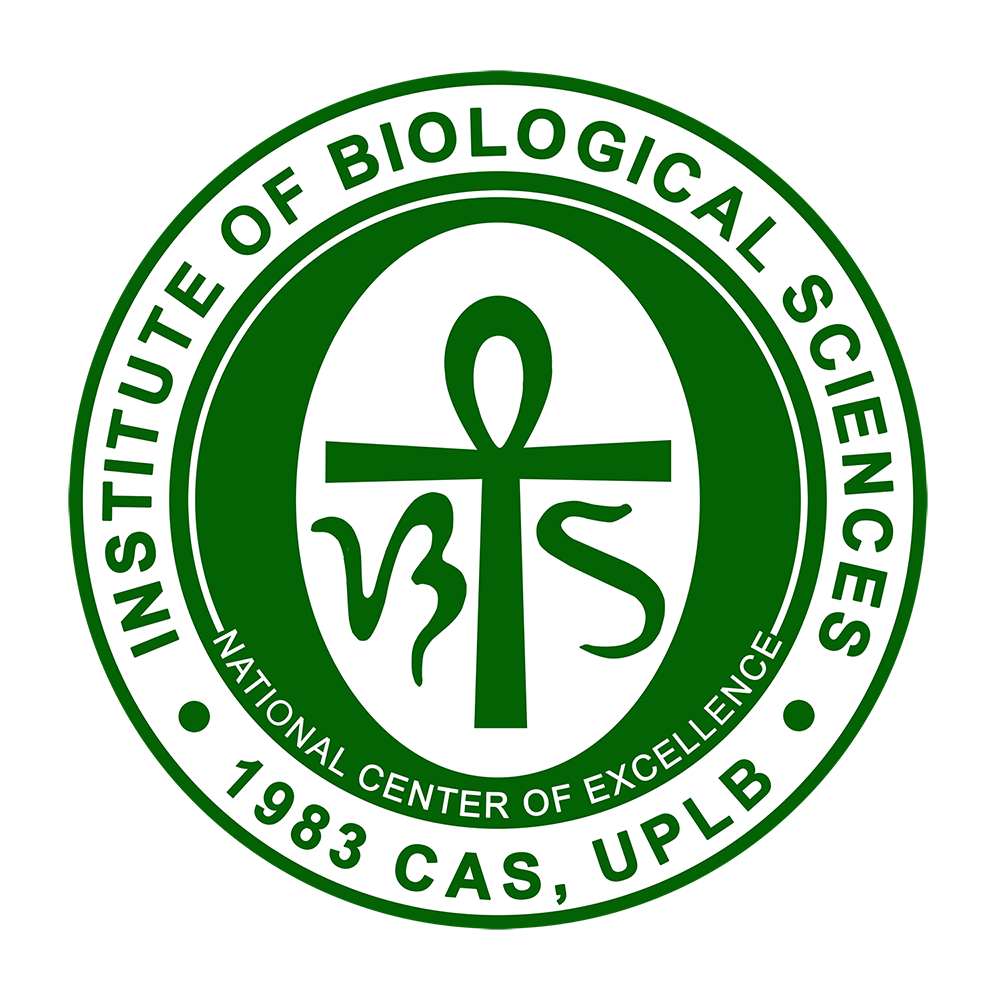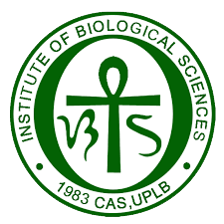Degree Programs
Undergraduate
Admissions
New freshmen and transferees from other schools who wish to enroll in one of our undergraduate programs can visit the website of the Office of the University Registrar at https://our.uplb.edu.ph/. Please direct your inquiries at our.uplb@up.edu.ph.
Shifting to BS Biology or BS Math and Science Teaching
UPLB students who want to shift to our undergraduate program must fulfill the following minimum requirements:
- Application letter addressed to the College Secretary of the College of Arts and Sciences and signed by the student, parent, adviser, and the Director of the Institute of Biological Sciences
- Justification for shifting
- Indicate student number and official email address
- True Copy of Grades (TCG) in all semesters enrolled.
- At least 30 units earned
- GWA of 2.25 or better for BS Biology
Please direct your inquiries at cas_ocs.uplb@up.edu.ph.
Graduate
Admissions
Interested applicants can visit https://gs.uplb.edu.ph/admission/how-to-apply/ for more information about the admission process. Please direct your inquiries at admissions.gs.uplb@up.edu.ph.
1. Bachelor of Science in Biology
The BS Biology program aims to produce graduates who are:
- imbued with a culture of excellence, discipline and competence in the ethical practice of Biology and other Biology-related fields;
- highly motivated, well-honed in research, with an intellectual mind-set open to experimentation and creativity;
- abreast with current developments and cutting edge technologies, well rounded, and able to rise to challenges; and
- fostering a broad, forward-looking perspective that is national, regional (ASEAN), global, and
contributing to the country’s development and progress
The curriculum allows the students to choose a major from the following areas and disciplines of biology: (a) Cell and Molecular Biology, (b) Ecology, (c) Genetics, Microbiology, (d) Plant Biology, (e) Systematics, (f) Wildlife Biology, and (g) Zoology. To meet the major requirements, the student must have (1) 6 units of thesis; (2) 3 units of practicum/on the job training; (3) minimum of 24 units of course work in a major area.
Please visit our page on BS Biology Majors for more information.
2. Bachelor of Science in Math and Science Teaching, Major in Biology
The graduates of the BS Mathematics and Science Teaching program shall:
- be competent teachers of high school mathematics and science;
- be able to address classroom issues and problems through the use of effective pedagogy and didactics;
- participate in activities addressing educational reforms in view of uplifting the state of education of the Philippines;
- be imbued with educational values relevant to the practice of the profession;
- be committed to serve the Filipino youth as role models, maintaining high professional standards in various school settings throughout the country especially the rural areas; and
- engage in lifelong learning activities to enable them to become useful citizens of the country and the world.
3. MS and PhD Genetics
These degree programs are offered by the Genetics and Molecular Biology Division of the Institute of Biological Sciences, together with other units in UPLB. The two graduate programs aim to furnish the student with a firm background in Biology with specialization in Genetics and to prepare the students for competence in instruction, research and extension. The programs are managed by an interdepartmental Program Management Committee created by the Dean of the Graduate School. An Admission Committee screens applicants to the programs.
4. MS and PhD Microbiology
The M.S. in Microbiology was started in the Department of Plant Pathology, College of Agriculture and was carried on by the Microbiology Division, Institute of Biological Sciences (IBS), College of Arts and Sciences, UPLB to date. In 1982, the PhD program was instituted and was made possible through the coordinated efforts of the graduate faculty of the Microbiology Division, IBS and other departments and institutes of UPLB involved in the area of microbiology. The PhD program is being implemented by the graduate microbiology faculty with the members from the Microbiology Division, IBS as the lead group.
The Graduate Programs in Microbiology aim to produce highly qualified graduates needed primarily in learning and research institutions and industries. The graduates of these programs shall be equipped with comprehensive knowledge and skills in microbiology supported concepts from other fields (molecular biology, biochemistry, statistics, biotechnology and genetics). They shall possess in-depth skills in solving specific problems in microbiology in the context of providing the basic needs of man: food, health and energy. In addition, the graduates of the PhD program should be capable of analyzing problems in microbiology, stimulating critical inquiry and conducting independent research.
5. MS and PhD Molecular Biology and Biotechnology
The MS and PhD program in Molecular Biology and Biotechnology is an interdisciplinary program which involves the following UPLB units: College of Agriculture, College of Arts and Sciences, College of Forestry and Natural Resources, College of Veterinary Medicine, College of Engineering and Agroindustrial Technology, College of Human Ecology, College of Economics and Management, School of Environmental Science and Management, College of Public Affairs, and the National Institute of Molecular Biology and Biotechnology.
The Graduate School supervises the implementation of the program through a management committee composed of chairs of the cluster committees for each of the four clusters in the Basic Sciences, Plant Sciences, Animal Sciences and Physical Engineering Sciences and Environmental Biotechnology. The members of these committees constitute the Graduate Faculty in Molecular Biology and Biotechnology (GFMBB). The GFMBB is directly under the Graduate School. The members of the GFMBB nominate and elect two members at large to the Management Committee. Graduate School provides administrative support to the Management Committee.
6. MS and PhD Botany
The MS and PhD programs are part of the post-baccalaureate degree offerings of the Institute of Biological Sciences administered by the UPLB Graduate School. The main goals are to develop the ability of the students to undertake critical inquiry and independent research in the plant sciences leading to their substantial contribution to this field, to widen their field of knowledge, as well as to develop their professional leadership. The first PhD graduate can be traced in 1972 when this program was then offered by the Department of Botany of the College of Arts and Humanities. With the renaming of the College of Arts and Humanities to College of Arts and Sciences in 1977, this program continued to grow and flourish at the Institute of Biological Sciences formally established in 1983.
7. MS Wildlife Science (joint program with College of Forestry and Natural Resources)
The University of the Philippines Los Baños is the only Constituent Unit (CU) that offers the Master of Science Wildlife Studies, the only graduate program of wildlife studies in the Philippines. This unique graduate program is instrumental in the professional advancement of conservation scientists, educators, environment and protected area managers and researchers in the academe, the government and conservation organizations. It continues to fill up the dearth of vertebrate wildlife specialists in the country. With advances in technology and dynamic human resource development, the UPLB GS offers a revitalized MS Wildlife Science program curriculum. The revised program strengthens the scientific approaches to support conservation and management as it keeps abreast with global conservation dynamics and development in biology, conservation and management of vertebrate wildlife.
This graduate program adheres to the original “Wildlife” definition used since its inception, particularly on non-domesticated, terrestrial vertebrates or tetrapods (amphibians, reptiles, birds and mammals) found in the wild and in their natural habitat. Nonetheless, the program recognizes a wider scope of wildlife, referring to all wild fauna and flora, including micro-organisms, and comprising the component biological diversity in natural environments. Focus on higher vertebrates facilitates an integrative approach with organisms related to wildlife (ex. parasites, arthropod prey, plant food etc.). The corresponding management and conservation approaches in wildlife research also emphasizes the interconnection with allied fields of science (ex. forestry, environmental sciences, medicine, anthropology, biotechnology and others). Graduates of this revised program possess the following competencies: (i) specialists in vertebrate wildlife biology, management and conservation; (ii) researchers who can develop and conduct programs for vertebrate wildlife; (iii) policy and decision makers for the implementation, assessment and monitoring of sustainable vertebrate Wildlife Management and Conservation programs; and (iv) educators of stakeholders and communities for effective conservation of vertebrate wildlife.
Visit https://abdibsuplb.wordpress.com/graduate/ for more information about the program.
8. MS Zoology and PhD Zoology by Research
The MS Zoology program of the University of the Philippines Los Baños has produced graduates who have distinguished themselves in their chosen profession. The Animal Biology Division, Institute of Biological Sciences and the UPLB Graduate School revised in the program to further equip the students with the knowledge and skills highly relevant in the application of interdisciplinary approaches to address issues related to zoology and human society. This revitalized academic preparation is designed to produce globally competitive graduates who will contribute to national development as a highly competent teacher, researcher and extension specialist.
The revised curriculum makes the MS Zoology program highly relevant by incorporating courses that address cross-cutting issues confronting key sectors, both in government institutions and private industries. The number of areas of specialization will be reduced to streamline the program and reflect the integrative approach in animal biology. In addition, specialization courses on emerging fields are instituted to further enrich the program and provide more flexibility to meet the diverse needs and interests of the students. Graduates of this revised program possess the following minimum competencies: (i) apply a systematic, advanced knowledge to their chosen field of interest; (ii) design and conduct research; and (iii) formulate strategies and interventions related to animal biology. The program aims to produce globally competitive and highly competent graduates who can: 1. design studies to investigate issues related to animal biology; 2. evaluate innovative strategies and interventions to solve issues concerning animal biology; and 3. contribute significantly to the updating and enrichment of zoological information for the benefit of various stakeholders.
The PhD Zoology by Research is our newest program designed for students who want to conduct their own zoological research using advanced methods with the guidance of their research supervisor. Among the potential fields of specialization include parasitology, marine biology, freshwater ecology, vertebrate physiology, and invertebrate biology.
Visit https://abdibsuplb.wordpress.com/graduate/ for more information about these programs

